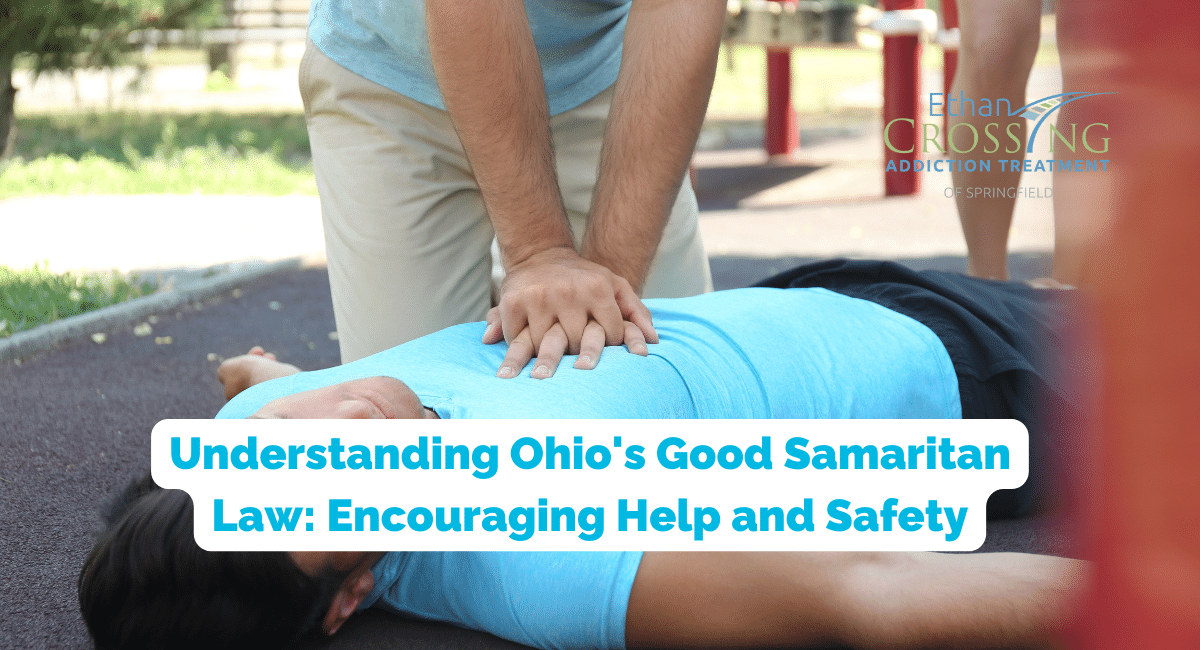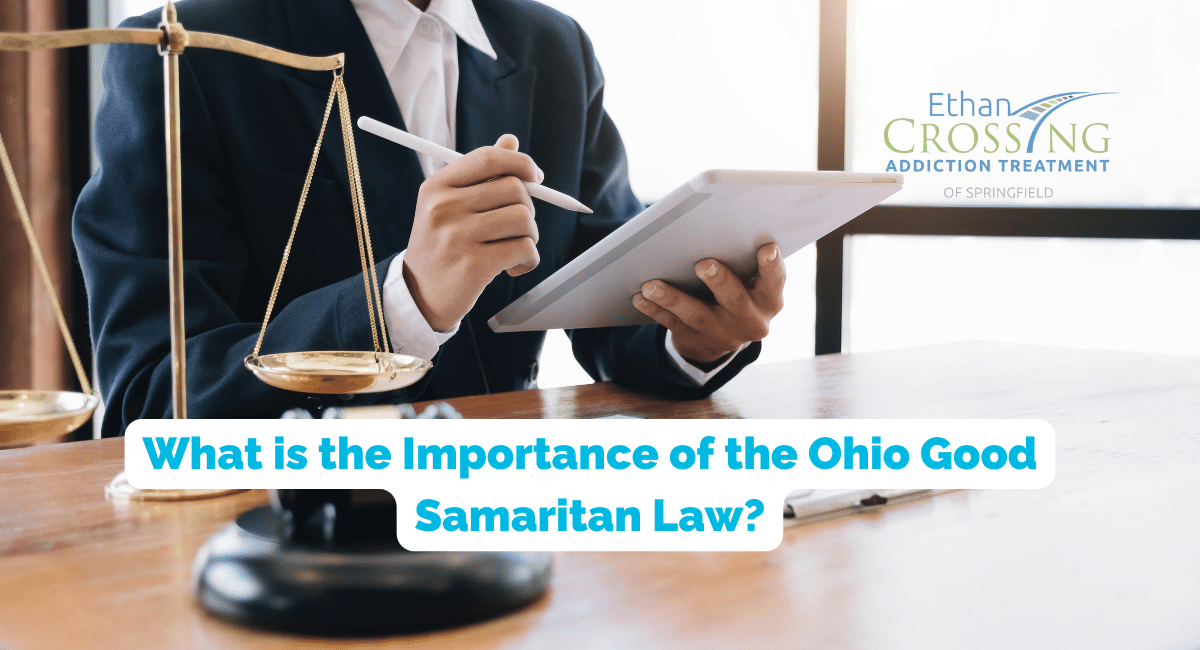When witnessing an emergency, many individuals hesitate to lend a helping hand due to fears of legal consequences. The Ohio Good Samaritan Law steps in to address this reluctance and promote immediate assistance. By granting limited immunity from prosecution, the law encourages individuals to overcome their fears and come to the aid of those in need.
It eliminates the worry of legal repercussions for actions taken in good faith during emergencies, such as calling 911 or administering lifesaving measures like naloxone. With the Ohio Good Samaritan Law in place, people can confidently provide crucial help, knowing that their actions are protected and valued.
Table of Contents
What is Ohio’s Good Samaritan Law?
Ohio’s Good Samaritan Law is designed to provide legal protection to individuals who render emergency care or assistance to others in good faith, without expecting compensation, at the scene of an emergency.
The law is codified under Ohio Revised Code Section 2305.23 and states that “No person shall be liable in civil damages for administering emergency care or treatment at the scene of an emergency outside of a hospital, doctor’s office, or other place having proper medical equipment, for acts performed at the scene of such emergency, unless such acts constitute willful or wanton misconduct.”
Under Ohio’s Good Samaritan Law, a person who acts as a Good Samaritan is generally immune from civil liability for any damages arising from their acts or omissions while providing emergency care or assistance unless their actions amount to willful or wanton misconduct.
The law applies to situations where emergency care or assistance is provided at the scene of an emergency, which can include accidents, medical emergencies, or any other sudden or unexpected occurrence that requires immediate attention.
what constitutes willful or wanton misconduct under Ohio’s Good Samaritan Law?
Under Ohio’s Good Samaritan Law, a person who renders emergency care or assistance in good faith is generally protected from civil liability unless their actions amount to willful or wanton misconduct. Willful or wanton misconduct refers to behavior that goes beyond mere negligence and involves a conscious disregard for the rights and safety of others.
While the Ohio Revised Code does not provide an explicit definition of willful or wanton misconduct in the context of the Good Samaritan Law, Ohio courts have interpreted it to encompass actions that demonstrate a reckless or intentional disregard for the well-being of others. Some factors that may be considered in determining whether misconduct rises to the level of willful or wanton include:
- Conscious disregard: The person acted with the knowledge that their conduct could cause harm or injury.
- Deliberate indifference: The person exhibited a reckless disregard for the consequences of their actions or omissions.
- Gross negligence: The person’s conduct was significantly below the standard of care expected in the given situation.
- Intentional harm: The person intentionally caused harm or injury to the individual they were trying to help.
It’s important to note that the determination of willful or wanton misconduct is a factual and legal determination that may vary depending on the specific circumstances of each case. Courts will consider the particular facts, the actions taken, and the overall context in assessing whether the person’s conduct falls within the scope of willful or wanton misconduct.
What is the Importance of the Ohio Good Samaritan Law?
The Ohio Good Samaritan Law serves several important purposes and carries significant importance:
1. Encourages assistance during emergencies
The law aims to promote a culture of helping and encouraging individuals to provide aid and care to others in emergency situations. By offering legal protection, it seeks to remove barriers and fears that may otherwise prevent people from taking action to help those in need.
2. Protection from liability
The law provides a level of legal immunity to individuals who render emergency care or assistance in good faith. This protection helps alleviate concerns about potential lawsuits or civil liability that may arise from unintentional harm caused during the rescue or aid-giving process.
3. Public safety and well-being
By providing legal protection, the law promotes public safety and the welfare of individuals in emergency situations. It encourages timely and appropriate action by eliminating the fear of legal consequences, enabling bystanders to step forward and provide necessary aid without hesitation.
4. Increased likelihood of prompt assistance
The existence of the Good Samaritan Law may increase the likelihood of bystander intervention and prompt assistance during emergencies. When people know they are protected by law, they may be more willing to take action, potentially reducing the severity of injuries, preventing further harm, or even saving lives.
5. Community engagement and solidarity
The law fosters a sense of community engagement and solidarity by emphasizing the importance of looking out for one another during times of crisis. It promotes the idea that individuals have a moral obligation to help others in need and that their actions will be supported by legal protections.
The Ohio Good Samaritan Law plays a crucial role in facilitating emergency care and assistance, promoting public safety, and fostering a culture of compassion and support within the community.
However, individuals who provide this emergency help must:
- Avoid demanding payment before providing first aid: Helpers should not request or require payment in exchange for rendering emergency care or assistance. The provision of aid should be based on the immediate need for help, rather than any expectation of compensation.
- Refrain from intentionally harming individuals in need: Helpers must never intentionally cause harm to accident victims or individuals experiencing a medical emergency. The purpose of providing assistance is to alleviate suffering and promote well-being, not to inflict further harm.
- Avoid seeking payment after an emergency unless it is for a healthcare organization: Helpers should not ask for payment from those they assist once the emergency situation has been resolved. The exception to this is if the payment is directed to a recognized healthcare organization for which the helper works and was on duty during the emergency.
Drug Overdose and the Ohio Good Samaritan Law
The Ohio Good Samaritan laws generally encourage and protect individuals who call 911 or seek emergency medical assistance in drug overdose emergencies.
These Good Samaritan laws provide limited immunity from prosecution or certain legal consequences for specific drug-related offenses when a person seeks medical assistance for a drug overdose. This means that individuals who call 911 in a drug overdose emergency are generally protected from being arrested, charged, or prosecuted for certain drug offenses, such as drug possession or drug paraphernalia possession, that may be discovered as a result of the emergency response.
This exemption helps to encourage individuals to prioritize seeking immediate medical assistance over fears of legal consequences. However, it’s important to note that the protections provided by the Ohio Good Samaritan law are limited to drug-related offenses and are aimed at encouraging individuals to seek help during an overdose emergency. They do not grant immunity for other drug-related crimes, such as drug trafficking or distribution, or for non-drug-related offenses that may be discovered during the emergency response.
Conclusion
In conclusion, the Ohio Good Samaritan Law is crucial in addressing drug overdose emergencies. By providing legal protections, it encourages individuals to seek emergency assistance without fear of prosecution. The law prioritizes public health and emphasizes the importance of immediate intervention while recognizing its limitations to drug-related offenses. Overall, the Good Samaritan Law fosters a compassionate and effective response to drug overdoses, promoting the well-being and safety of those in need.












